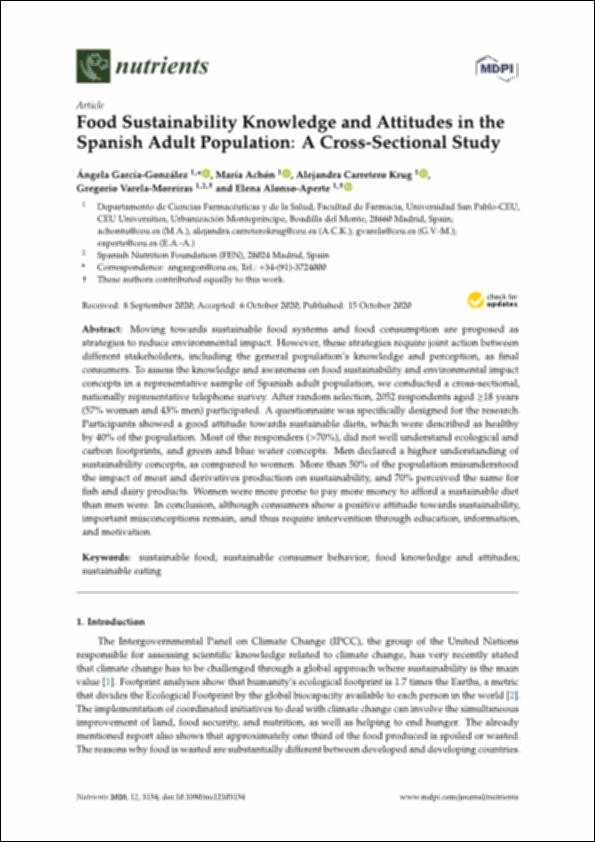Por favor, use este identificador para citar o enlazar este ítem:
http://hdl.handle.net/10637/14901Food Sustainability Knowledge and Attitudes in the Spanish Adult Population: A Cross-Sectional Study
| Título : | Food Sustainability Knowledge and Attitudes in the Spanish Adult Population: A Cross-Sectional Study |
| Autor : | García González, Ángela Achón y Tuñón, María Carretero Krug, Alejandra Varela Moreiras, Gregorio Alonso Aperte, Elena |
| Materias: | Sustainable food; Sustainable consumer behavior; Food knowledge and attitudes; Sustainable eating |
| Editorial : | MDPI |
| Citación : | Food Sustainability Knowledge and Attitudes in the Spanish Adult Population: A Cross-Sectional Study. García-González Á, Achón M, Carretero Krug A, Varela-Moreiras G, Alonso-Aperte E. Nutrients. 2020 Oct 15;12(10):3154. doi: 10.3390/nu12103154.PMID: 33076442 |
| Resumen : | Moving towards sustainable food systems and food consumption are proposed as strategies to reduce environmental impact. However, these strategies require joint action between di erent stakeholders, including the general population’s knowledge and perception, as final consumers. To assess the knowledge and awareness on food sustainability and environmental impact concepts in a representative sample of Spanish adult population, we conducted a cross-sectional, nationally representative telephone survey. After random selection, 2052 respondents aged 18 years (57% woman and 43% men) participated. A questionnaire was specifically designed for the research. Participants showed a good attitude towards sustainable diets, which were described as healthy by 40% of the population. Most of the responders (>70%), did not well understand ecological and carbon footprints, and green and blue water concepts. Men declared a higher understanding of sustainability concepts, as compared to women. More than 50% of the population misunderstood the impact of meat and derivatives production on sustainability, and 70% perceived the same for fish and dairy products. Women were more prone to pay more money to a ord a sustainable diet than men were. In conclusion, although consumers show a positive attitude towards sustainability, important misconceptions remain, and thus require intervention through education, information, and motivation. |
| URI : | http://hdl.handle.net/10637/14901 |
| Derechos: | http://creativecommons.org/licenses/by/4.0/deed.es OpenAccess |
| ISSN : | 2072-6643 |
| Fecha de publicación : | 15-oct-2020 |
| Centro : | Universidad San PABLO-CEU |
| Aparece en las colecciones: | Facultad de Farmacia |
Los ítems de DSpace están protegidos por copyright, con todos los derechos reservados, a menos que se indique lo contrario.


